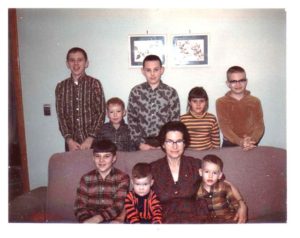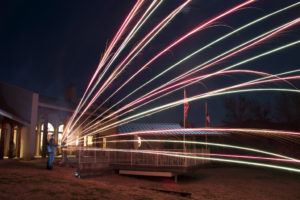 Memory is the great blessing of a happy life. I have nothing but pleasant memories of my mother’s family’s Fourth of July cookouts, which rank among the highlights of my small-town youth. Those picnics are part of the distant past now, and my parents and all but one of my mother’s siblings are dead. My brother and sister-in-law (bless them!) brought the remaining members of our family together last summer for a reunion that was joyous almost beyond belief, but nothing can quite measure up to the remembered pleasures of childhood. Fortunately, I have enough of those to last me the rest of my days.
Memory is the great blessing of a happy life. I have nothing but pleasant memories of my mother’s family’s Fourth of July cookouts, which rank among the highlights of my small-town youth. Those picnics are part of the distant past now, and my parents and all but one of my mother’s siblings are dead. My brother and sister-in-law (bless them!) brought the remaining members of our family together last summer for a reunion that was joyous almost beyond belief, but nothing can quite measure up to the remembered pleasures of childhood. Fortunately, I have enough of those to last me the rest of my days.
In 1991, a quarter of a century ago, I published a memoir in which, among many other things, I described those Fourth of July cookouts. This is part of what I wrote. I posted it in this space two years ago, and it still gives me pleasure to read. I hope you feel the same way.
* * *
We would pull into my grandmother’s driveway early in the afternoon. My parents would go inside to sit with the old people and take part in the slow, steady talk that holds a large family together. (I thought of my aunts and uncles as “the old people,” though they were no older than I am now.) I went inside to say hello, too, but I slipped away as quickly as I could, for there were better things to do on a summer day than sitting around listening to the old people talk. Sometimes I played softball with Mike, Bob, and Gary, my older cousins, in the empty lot next to Uncle Marshall’s garage. Sometimes I shinnied up the low-slung mimosa tree next to my grandmother’s house. Sometimes I walked down the road to Uncle Albert’s house or across the street to Dot and Marshall’s to gaze jealously at a new toy. Sometimes I hid out in Dot and Marshall’s living room and spent the day reading about Huckleberry Finn or Captain Ahab.
 Later in the day, the older cousins would start dipping into their private stashes of small-bore fireworks suitable for daytime use. Gary favored tiny cylinders that swelled into long, wormy spirals of ash that left huge gray-and-black smears on the front porch; Bob preferred little pellets that exploded with an ear-shattering crack when thrown at the nearest rock. Mike usually had a bag full of smoke bombs, and I liked those best. You put a little cardboard sphere in the middle of a dirt road, lit the fuse, and watched it belch forth clouds of foul green smoke. I had no fireworks of my own, for my parents were certain that it would be crazy to turn me loose with them, and they were probably right. So I watched and waited and tried from time to time to talk Mike into letting me touch the glowing end of a piece of punk to the stubby fuse of one of his smoke bombs.
Later in the day, the older cousins would start dipping into their private stashes of small-bore fireworks suitable for daytime use. Gary favored tiny cylinders that swelled into long, wormy spirals of ash that left huge gray-and-black smears on the front porch; Bob preferred little pellets that exploded with an ear-shattering crack when thrown at the nearest rock. Mike usually had a bag full of smoke bombs, and I liked those best. You put a little cardboard sphere in the middle of a dirt road, lit the fuse, and watched it belch forth clouds of foul green smoke. I had no fireworks of my own, for my parents were certain that it would be crazy to turn me loose with them, and they were probably right. So I watched and waited and tried from time to time to talk Mike into letting me touch the glowing end of a piece of punk to the stubby fuse of one of his smoke bombs.
After the last firecracker was lit and tossed, I crawled into the wooden swing on the crumbling front porch of my grandmother’s house and rocked into the breeze. Once in a while I brought a book with me, for there are few things as pleasant as reading a good book while sitting in a porch swing on a breezy summer day. More often, though, I left my book in the car, especially after my spindly legs grew long enough to reach the concrete floor of the porch. Then I would sit at the very edge of the broad wooden seat, kick as hard as I could and push the swing higher and higher into the air, high enough that the soles of my sneakers scraped the ceiling and the heavy chains of the swing gave off a scary thump every time I fell back to earth. The higher I swung, the surer I was that the rusty bolts would gradually work their way out of the rotten wood of the ceiling, sending me flying through the air to a bloody but glorious death. Before long, one of the old people always came stomping out of the house and told me to cut it out before I cracked my fool head open.
In the middle of the long afternoon, the whole family gathered on the front porch to make ice cream. The older cousins took turns cranking the old wooden freezer. After half an hour of steady cranking, Uncle Albert unscrewed the lid of the freezer and scooped out rich, grainy, colder-than-cold bowls of pale yellow custard. I ate mine in silence, nursing an ice-cream headache. Then the aunts retired to the kitchen and the uncles set up charcoal grills in the front yard and build roaring fires. Dinner was served as the sun began to set. We wolfed down hot dogs, hamburgers, barbecued pork steaks, potato salad, creamed corn, hot rolls, and my mother’s spicy baked beans. Then we cleared away the dishes and ate more ice cream and sat and talked until the last light had died away and it was time to cross the dirt road to the empty lot and shoot fireworks.
The old people gave each child a silver sparkler and a skinny brown stick of punk that filled the air with an incenselike smell when lit. As we waved our sparklers, Uncle Albert placed a squat, five-barreled cardboard cylinder on the ground. Mike approached it slowly and ceremonially, punk in hand, the other cousins looking on from a safe distance. We held our breath as he cautiously touched the fuse at the bace of the cylinder with the smoldering stick of punk. Nothing happened. He touched it again. Was this one a dud? Then the fuse caught fire with a loud, rasping fizz and Mike darted away as a dozen red and green and blue fireballs shot into the air and exploded into a million golden dots of short-lived flame.
 My father liked Roman candles, and I remember the first Fourth of July that he let me hold one on my own. First came the warning: “This isn’t a toy, son. You could put somebody’s eye out with it. Point it up and away and whatever you do, don’t aim it at anybody. Do you understand?” I nodded, my heart racing with excitement. Then he lit the top end and handed me the slim cardboard tube. I pointed it up and away, but I knew that it was aimed at somebody, though I told no one that I was actually a mighty warrior locked in single combat with the evil forces of darkness. I shouted every time the sizzling tube went crump and lit up the sky with gaudy bursts of lightning, each one aimed squarely at the forehead of a giant monster from outer space. I dreamed of blue fireballs for weeks.
My father liked Roman candles, and I remember the first Fourth of July that he let me hold one on my own. First came the warning: “This isn’t a toy, son. You could put somebody’s eye out with it. Point it up and away and whatever you do, don’t aim it at anybody. Do you understand?” I nodded, my heart racing with excitement. Then he lit the top end and handed me the slim cardboard tube. I pointed it up and away, but I knew that it was aimed at somebody, though I told no one that I was actually a mighty warrior locked in single combat with the evil forces of darkness. I shouted every time the sizzling tube went crump and lit up the sky with gaudy bursts of lightning, each one aimed squarely at the forehead of a giant monster from outer space. I dreamed of blue fireballs for weeks.
* * *
Dawn Upshaw, David Zinman and the Orchestra of St. Luke’s perform Samuel Barber’s Knoxville: Summer of 1915. The text is by James Agee:
